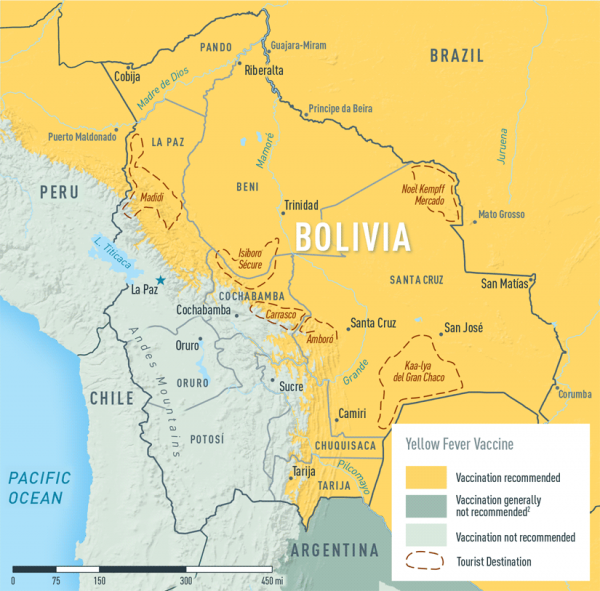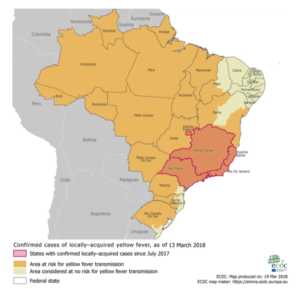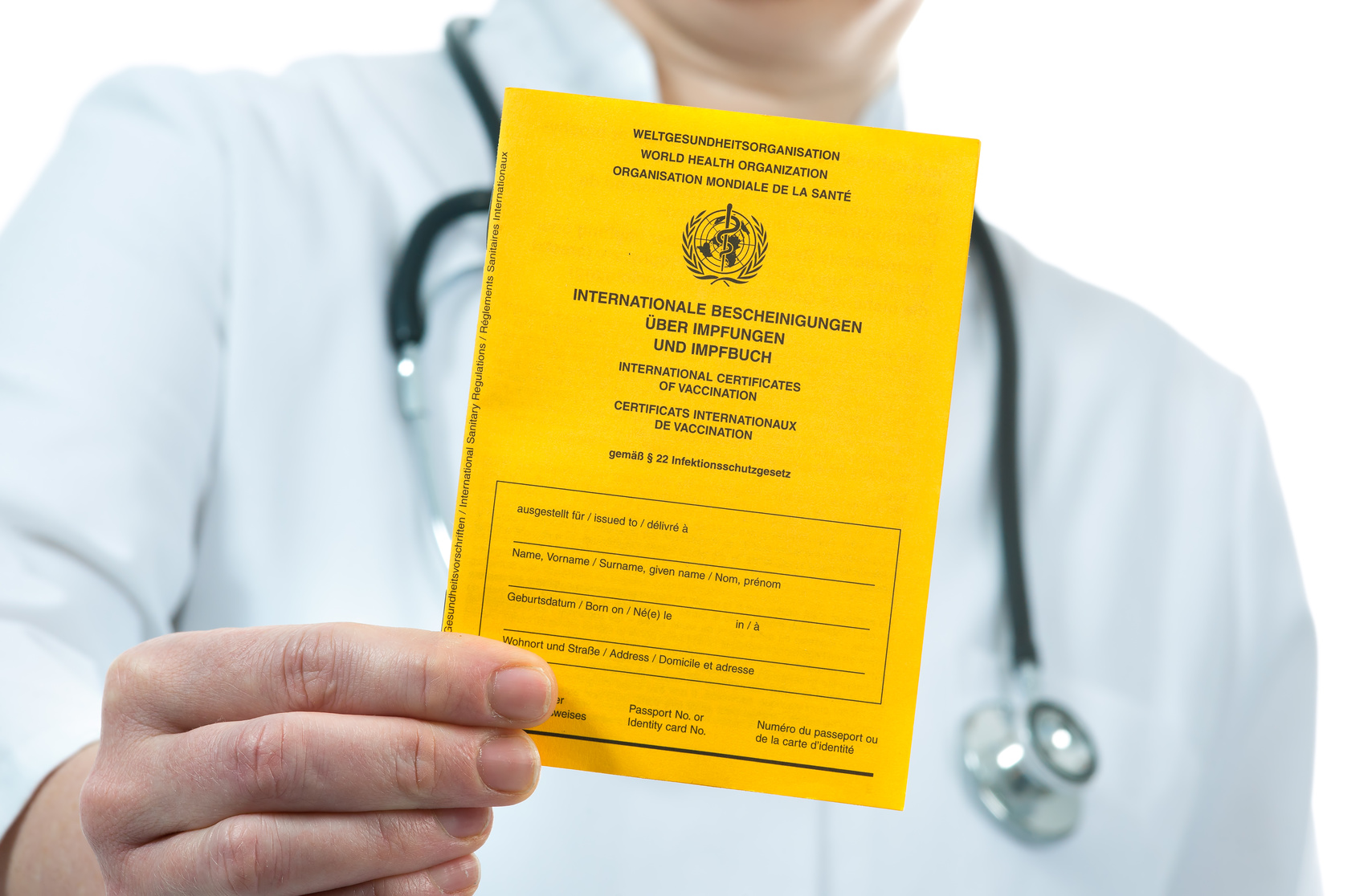Tag: Yellow Fever
Yellow Fever Update:
Recent news reports have raised concerns about yellow fever vaccine safety. It is important to understand the risks and benefits.
For decades, the yellow fever vaccine was considered to be extremely safe. More recently, however, we have become aware of a low rate of serious adverse effects occurring when older travellers are vaccinated for the first time. The two main types of adverse effects are called YEL-AVD and YEL-AND – the first involves damage to organs such as the liver, and the second damages the nervous system. Yellow fever vaccines contain live viruses that do not harm people with a normally functioning immune system but do seem to cause harm in a tiny proportion of people with an ageing immune system, as well as those with reduced immunity from other causes.
In one of the largest medical studies of yellow fever vaccine safety, the rate of YEL-AND in people aged 60-69 was 2.5 per 100,000 people vaccinated, and in over 70s was 1.6 per 100,000. For YEL-AND, the rates were zero and 4.0 per 100,000 respectively.
According to the US Centers for Disease Control, in the absence of a yellow fever outbreak, the “background” risk of yellow fever occurring in unvaccinated travellers on a 2-week trip to a zone where yellow fever is present is calculated to be:
- West Africa: 50 cases per 100,000, with 10 deaths per 100,000
- South America: 5 cases per 100,000, with 1 death per 100,000
Yellow fever vaccinating centres normally explain these risks to everyone they vaccinate, and in particular to travellers aged over 60. Vaccination for personal protection is recommended where benefit outweighs the risks, and a medical waiver is given when it is not safe for the vaccine to be used. Age alone is not a reason for issuing a waiver.
Other factors that complicate the picture include the following:
- There are active outbreaks of yellow fever in several parts of the world, notably at present in Brazil as well as in several African countries, so the risk to travellers is often much higher than that quoted above.
- Vaccination is the only way to prevent and control yellow fever and is often the only possible public health measure for entire populations.
- Many countries therefore rigorously enforce vaccine requirements as a condition of entry.
- Yellow fever vaccine shortages are common – there is currently a serious shortage in the USA, and the vaccine is not always available when needed.
- Awareness of vaccine risks has come with a stricter approach to recommending vaccine only when travellers are definitely going to be at risk; however, an unintended consequence of this has been to delay the opportunity to vaccinate travellers for the first time until they are older and at greater risk of adverse effects.
The World Health Organization now considers vaccine protection to be life-long, though border officials in several countries do not always recognise this. A small number of recent cases of yellow fever in Brazil among people who had been vaccinated previously has raised further doubt about this policy, and Brazil currently recommends revaccination every 10 years. Revaccination has not been linked to adverse effects.
There is currently extensive UK press coverage (that has also been picked up in the US) of YF vaccine adverse effects – one death occurred shortly after vaccination in a distinguished cancer researcher, and a psychotic reaction in a former BBC journalist vaccinated in Greece. Both cases were attributed to the vaccine because of the timing. Further clinical details are not available, so we can’t yet be certain of a direct link, but this news will undoubtedly have a considerable impact on public perception of the vaccine.
Written by: Richard Dawood, Medical Director and specialist in travel medicine
Book your yellow fever vaccination today.
Links:
- Cancer pioneer Martin Gore’s sudden death from routine jab – Source: The Times
- I had a yellow fever jab, then the voices told me: ‘Kill! Kill! Kill!” – Source: The Times
UPDATED RECOMMENDATIONS FOR Yellow Fever VACCINATION: Nigeria
The World Health Organization recently updated the yellow fever recommendations and requirements for residents and travellers to Nigeria.
As of 1 July 2019, the yellow fever certificate requirement for travellers to Nigeria changed. All travellers aged 9 months or over are now required to travel with a yellow fever vaccination certificate along with a valid visa. Failure to provide a valid certificate where required could deny entry to that country, or result in quarantine.
Previously a certificate was only required for those arriving from risk areas countries. However, an on-going outbreak of yellow fever, which started in September 2017, is continuing therefore a revised classification has been made. Between January and April 2019, a total of 930 suspected cases were reported in 447 Local Government Areas.
Advice for travellers
The Fleet Street Clinic would like to remind all travellers from the United Kingdom that there is a risk of yellow fever transmission throughout Nigeria.
We are a Certified Yellow Fever Centre with availability throughout the week and are usually able to accommodate same day appointments requests.
What is Yellow Fever?
Yellow Fever is an acute viral haemorrhagic disease transmitted by infected mosquitoes and has the potential to spread rapidly and cause serious public health impact. There is no specific treatment, although the disease is preventable using a single dose of yellow fever vaccine, which provides immunity for life.
For more information about Yellow Fever & the Vaccine.
Anyone travelling to Nigeria should book a Pre-Travel Consultation. One of our specialist Travel Nurses will access if a Yellow Fever vaccine is suitable for you.
Links:
World Health Organization
A safari in Namibia is a unique experience in Africa. It has the highest sand dunes on the continent, the world’s oldest and uninhabited deserts, the Skeleton Coast and a lush jungle to the north. Whatever you have planned on your trip, ensure you follow our top travel tips to stay healthy.
Vaccines
All travellers need to ensure they are up-to-date with Hepatitis A, Typhoid and Diphtheria, Tetanus and Polio (DTP). These are your basic traveller vaccine requirements. You may wish to consider further vaccinations against Rabies and Hepatitis B.
There is no risk of Yellow Fever in Namibia, however, travellers who will arrive in Namibia having transited from a country with a risk of Yellow Fever will be required to be in possession of a valid Yellow Fever Certificate.
Countries this would apply to include Kenya, Nigeria, Zambia, Ethiopia, Brazil, Peru and Bolivia. For the full list of countries with risk of yellow fever transmission as per the World Health Organisation.
For more information on our vaccines, please visit our travel and wellness vaccination pages.
Malaria
There is a risk of malaria in the northern areas of Namibia of the Kunene River, Caprivi and Kavango regions and Etosha National Park. Windhoek, Swakopmund and the Skeleton coast have a low risk of malaria. If you intend to visit malarial regions, ensure that you take the antimalarial medication with you. Mosquitoes that are responsible for the spread of malaria are most active between dusk and dawn, and therefore you need to be extra cautious during this time against mosquito bites.
Insects
Ticks, flies and mosquitoes all have the ability to transmit unpleasant disease in Namibia. The best prevention against these diseases is to avoid mosquito bites. Cover up as much as possible and apply a minimum concentration of 50% DEET to any areas of exposed skin. Clothes can be treated with permethrin before setting off to provide an extra level of protection. Sleep under a mosquito net especially if you plan to stay anywhere remote or rural.
See our Ultimate Bug Kit.
Food and water
Travellers should exercise caution with food and water when travelling to Namibia to avoid tummy troubles. Do not drink tap water in Namibia, stick to bottled water or water that has been boiled. If you are undertaking a self-drive trip and plan camping in remote areas it is a good idea to take either a water bottle with a filter or some chlorine dioxide tablets to make water safe to drink should you not be able to find a shop with bottled water. The Namib Desert is one of the aridest in the world so always ensure you pack extra water.
See our Worldwide Gastro Kit to help with any travellers tummy troubles.
Book your travel appointment online today.
By Anna Chapman | Travel Nurse | June 2019
Bolivia is famous for its salt flats and varied terrain spanning over the Andes Mountains, the Atacama Desert and Amazon Basin rainforest. Located in South America, the climate varies drastically from one eco-region to the other. Travelling around Bolivia you’ll experience different climatic extremes, such as humid tropical climates to subtropical climates to desert-polar climates. It is important to seek travel advice before travelling as medical advice can vary dependent on the area/s you plan to visit.
Our general advice includes:
Vaccines
Routine immunisations are a high priority; it is good to check that they are all up-to-date before travelling anywhere. Given the current worldwide outbreaks, we strongly recommend checking your immunity status to measles. A simple immunity test can confirm all those who are unable to source vaccine proof. The best protection against measles is having 2 doses of a measles-containing vaccination, such as the MMR.
Travel vaccinations for Bolivia vary depending on where you plan to travel, and what you plan to do. It is best to book a consultation with a travel nurse to discuss your upcoming adventure. They will assess what risks you will potentially be exposed to. From this, they can develop a bespoke treatment plan specifically for your holiday.
As a minimum, travellers should be protected against Hepatitis A, and diphtheria, tetanus and polio. Certain travellers may consider vaccinations against typhoid, Rabies, Hepatitis B and Yellow Fever.
Yellow Fever
Yellow Fever is an unpleasant virus spread by the Aedes aegypti mosquito. This mosquito tends to bite during the day and is present in many lowland areas of South America and in all areas below 2,300m in Bolivia. Travellers who intend to visit the lowlands, such as the Chaco, Santa Cruz district and the Amazon may be advised to have the vaccine.

If your travel route includes other South American countries, you may also require the vaccination and an accompanying Yellow Fever Certificate in order to enter that country. The vaccination is not suitable for everybody. A careful risk assessment should be undertaken by a practitioner that specialises in the vaccine. Yellow Fever can only be given at designated Yellow Fever vaccination centres (YFVCs) – Fleet Street Clinic is a registered clinic.
Altitude
Bolivia is home to some of the highest peaks of the Andes mountains, with elevations of over 6,000m. The frequently visited cities of La Paz, Potosi and Uyuni all soar over 3,500m, making altitude sickness a real risk. The risk can be reduced by ensuring you stay hydrated, plan a slow ascent and factor in some acclimatisation days. Acetazolamide (Diamox) can be used to help aid the process. Book a pre-travel assessment and speak to a travel nurse about your options.
Insects
Mosquitoes, bugs and flies do more than just bite. They have the ability to transmit diseases that aren’t always preventable by vaccination or medication. Illnesses such as dengue fever, chikungunya, Zika, yellow fever, malaria and sleeping sickness are a few risks.
The best prevention is to entirely avoid mosquito bites. Cover up as much as possible and apply a minimum concentration of 50% DEET to any areas of exposed skin. Spraying your clothes with permethrin before travelling can provide extra protection. Sleep under a mosquito net, especially, if you plan to stay anywhere remote or rural.
See our Ultimate Bug Kit.
Malaria
Malaria occurs in the northern parts of Bolivia, in the Beni and Pando districts. Travellers heading to these areas should ensure they take anti-malarial medication. Mosquitoes that spread malaria are predominantly night-time biters. So, extra precautions should be taken between dusk and dawn. Any travellers who experience fever or flu-like symptoms on return from their trip should ensure they get tested for malaria, as unfortunately, no single prevention method is 100% effective.
First Aid
Whilst medical services and pharmacies are available in bigger cities, access to basic services is limited or even non-existent in the remote regions. Travel prepared and take a small medical kit that can treat basic complaints. Pack painkillers, antiseptic cream, plasters or dressing, and medication in case you suffer from an upset stomach. Head over to our online shop to purchase an essential first aid medical kit. This contains all your travelling medical essentials.
If you are prone to allergies, a non-drowsy antihistamine is helpful. Furthermore, if you take prescription medication, be sure to pack enough to last you for your entire trip.
Book your travel appointment today
By Anna Chapman | Travel Nurse | May 2019
Brazil: Yellow Fever
The incidence of Yellow Fever cases in Brazil has been increasing recently, with over 1000 cases of Yellow Fever in Brazil since July 2017. The cases were reported in Sao Paolo, Minas Gerais, Rio de Janeiro, Espiritu Santo and Distrito Federal.
As well as an increase in human cases of yellow fever, 738 cases of yellow fever virus in monkeys have been reported. Since the outbreak, several unvaccinated travellers have contracted yellow fever, and there has been at least one death. Due to the ongoing outbreak, travellers going to at risk areas of Brazil are advised to get the Yellow Fever vaccination.
In addition the World Health Organisation also advised travellers heading to the states of Parana, Santa Catarina and Rio Grande do Sul should receive the vaccination, irrespective of location.
What is Yellow Fever?
Yellow Fever is a flavirus found in the tropics of Africa and South America.
Monkeys are a natural carrier for the virus and it is spread between monkeys and humans via the bite of an aedes mosquito.
Illness: It causes an acute viral illness which has a 50% mortality rate.
Prevention: The yellow fever vaccination should be considered for travellers who are visiting a high risk area. A single vaccination affords life long protection. The vaccination many not be suitable for everyone, so ensure you seek a full travel consultation.
Map of current areas with a risk of Yellow Fever

Book your travel appointment today
By Anna Chapman | Travel Nurse | February 2019
Senegal is one of West Africa’s most visited countries; it is considered one of the most stable democracies in Africa, which is probably why it is more popular than it’s neighbouring countries. Senegal offers the hustle and bustle of Dakar, the sand dunes of the Lompul Desert, the clear waters of the Casamance and tropical backwaters of the Sine-Saloum Delta. Unfortunately, a tropical environment comes with tropical diseases, especially ones that fly!
Don’t wing it with your health, follow our top travel tips to stay healthy and have a bug-free break …
Sleeping Sickness
Sleeping sickness, also known as “human African trypanosomiasis”, is caused by the tsetse fly, which is native to the African continent and generally active during the day. If an infected tsetse fly, which is carrying the parasite, bites you, it can cause acute trypanosomiasis. Sleeping sickness infects the brain causing confusion, disturbed sleep (hence the name) and can be fatal if not treated.
Malaria
Malaria is prevalent throughout the whole of West Africa, including Senegal. It is spread by the bite of an infected Anopheles mosquito. Generally, these mosquitos bite most often during dusk til dawn. All travellers to Senegal should take anti-malarial medication and take preventative measures against mosquitoes.
Yellow Fever
Yellow Fever is a virus spread by the Aedes mosquito, that is most active from dawn till dusk. Catching Yellow Fever can be fatal but can be prevented by vaccination. The vaccination gives a lifetime of protection, however, it is not suitable for everyone and a comprehensive risk assessment should be sought from a travel clinic. Additionally, there is a requirement to be in possession of a valid Yellow Fever certificate when entering Senegal from another infected country, especially those who plan onwards travel to Gambia or Guinea-Bissau.
Zika Virus
Zika Virus is spread by the Aedes mosquito which commonly bites during the day in urban settings, such as Dakar and St Louis. The majority of people who are infected with Zika virus have no symptoms, but if contracted during pregnancy or close to conception it can cause Congenital Zika Syndrome. Currently, there is no vaccination nor cure for Zika virus infection and strict precautions against mosquitoes should be taken.
Best prevention to banish those bugs?
- Wear long loose clothing and cover-up. If the insects can’t bite you, they can’t transmit their diseases to you.
- Use a minimum of 50% DEET spray on any exposed areas of skin and reapply regularly
- Sleep under a mosquito net
- Treat clothes with permethrin
- Ensure you receive a travel consultation prior to departure to receive the appropriate pre-travel vaccinations and medications against malaria and Yellow Fever
- You can purchase one of our Ultimate Bug Kits to help protect yourself
Book your travel appointment today
By Anna Chapman | Travel Nurse | February 2019
Panama sits on both the Pacific and Atlantic coasts. With its cloud forests, coffee farms, magical islands, world-class diving and a canal that connects two oceans, many people choose to make Panama their holiday destination.
If you plan to go, follow our travel tips to have a safe and healthy holiday.
Vaccinations for vacation
It is advised that all travellers be up-to-date with Diphtheria, Hepatitis A, Tetanus and Polio. Higher risk travellers may want to consider vaccinations against Typhoid, Rabies and Hepatitis B. It is best to speak with a travel expert to see what they advise for you.
You can find more information on our wellness and travel vaccinations.
Prevent mosquito bites
It is no longer necessary to take anti-malarial medication if visiting Panama. However, precautions against mosquito bites should be taken as viruses such as dengue fever, Zika virus and chikungunya can be transmitted in the region. Pack some insect repellent with at least 50% DEET, and take a mosquito net if you plan to stay in traditional accommodation that may not provide one. You can help protect yourself from mosquitos with our Ultimate Bug Kit.
Find out if you need a Yellow Fever Vaccination
Yellow Fever exists east of the Panama canal. If you plan to visit this area the vaccination is recommended. Also, those who plan to enter Panama from a country that has a risk of Yellow Fever (such as Colombia) will need to be in possession of a valid Yellow Fever Vaccination certificate.
Pack a first aid kit
A first aid kit with necessary medication and first aid items is a good idea. Accessing medical care and medical supplies in parts of the region can be difficult, especially for those who plan to visit the San Blas Islands, cloud forests or coffee farms. Those who plan on diving in the Bocas del Toro may wish to take out items such as ear drops for an infection, and antiseptic cream for any coral cuts.
Don’t get travel sick
A huge attraction in Panama is the coastline and archipelago, including the San Blas and the Pearl Islands. Accessing parts of Panama often involves long bumpy journeys by road and boat trips to the islands can often be choppy. If you suffer from travel sickness, ensure you pack medication to prevent this, and take it before you set out on the journey to prevent feeling queasy.
Book your travel appointment today
By Anna Chapman | Travel Nurse | January 2019
Madagascar
Madagascar is a large country off the south east coast of Africa. It is well known for its rainforests, hiking and diving, beaches and reefs.
Make sure you are aware of what you need, such as visas, vaccines and other medical requirements.
Check your flight route
You may need a Yellow Fever certificate. Whilst most flights involve a change of plane in Paris, some flights route via Nairobi, Kenya. If you have a long lay over in Nairobi you will be required to provide on entry to Madagasgar, a valid Yellow Fever certificate.
Don’t risk rabies
Rabies is a virus found in mammals and is fatal if not treated promptly. Treating rabies can be difficult in Madagascar, but is made much simpler for those who receive rabies vaccinations prior to travel. If the focus of your trip is the mammals of Madagascar, rabies vaccinations pre-trip is strongly recommended.
Banish the bites
Make sure you wear plenty of insect repellent whilst away as Madagascar has several diseases that can be spread via the bite of a mosquito or fly. Insect repellent should contain at least 50% DEET. Anti-malarial medication is always advised for Madagascar. Protect yourself from mosquitos with our Ultimate Bug Kits.
Travel with Insurance
Ensure you take out comprehensive travel insurance before you go to Madagascar, and ensure that it covers you any activities you may have planned (such as scuba diving).
FLEET STREET TRAVEL CLINIC
Book your travel appointment today
By Anna Chapman | Travel Nurse | August 2018
Dr Richard Dawood, our Medical Director and Travel Medicine specialist answers frequently asked questions about Yellow Fever and the Yellow Fever vaccine in our new video.






